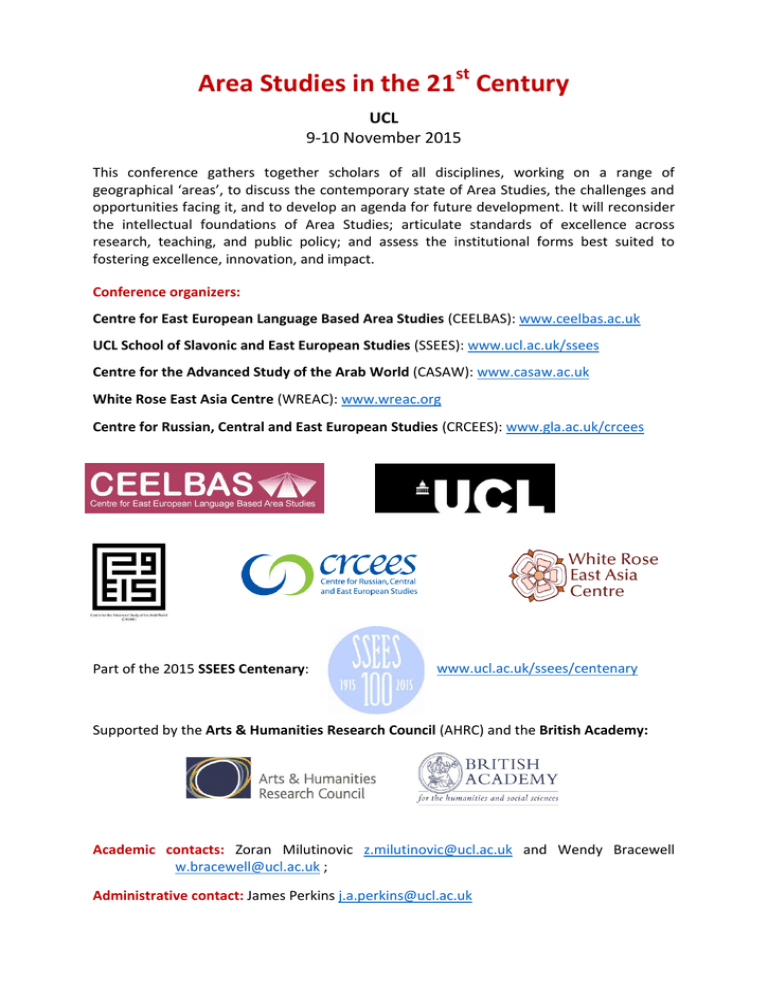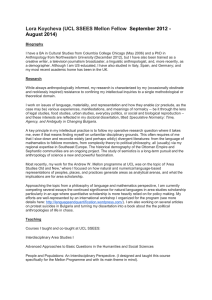Area Studies in the 21 Century st UCL
advertisement

Area Studies in the 21st Century UCL 9-10 November 2015 This conference gathers together scholars of all disciplines, working on a range of geographical ‘areas’, to discuss the contemporary state of Area Studies, the challenges and opportunities facing it, and to develop an agenda for future development. It will reconsider the intellectual foundations of Area Studies; articulate standards of excellence across research, teaching, and public policy; and assess the institutional forms best suited to fostering excellence, innovation, and impact. Conference organizers: Centre for East European Language Based Area Studies (CEELBAS): www.ceelbas.ac.uk UCL School of Slavonic and East European Studies (SSEES): www.ucl.ac.uk/ssees Centre for the Advanced Study of the Arab World (CASAW): www.casaw.ac.uk White Rose East Asia Centre (WREAC): www.wreac.org Centre for Russian, Central and East European Studies (CRCEES): www.gla.ac.uk/crcees Part of the 2015 SSEES Centenary: www.ucl.ac.uk/ssees/centenary Supported by the Arts & Humanities Research Council (AHRC) and the British Academy: Academic contacts: Zoran Milutinovic z.milutinovic@ucl.ac.uk and Wendy Bracewell w.bracewell@ucl.ac.uk ; Administrative contact: James Perkins j.a.perkins@ucl.ac.uk Keynote Speakers Professor Mark Beissinger Princeton University (on Russia) Professor Theodore C. Bestor Harvard University (on Japan) Professor Wendy Bracewell University College London (on Eastern Europe) Professor Robert Gleave University of Exeter (on the Middle East) Dr Susan Hodgett University of Ulster (on Area Studies & Canada) Professor Edward Roger Owen Harvard University (on the Middle East) Detailed Rationale Area Studies cannot be grounded in the significance of specific geographical areas. All ‘areas’ are historically contingent, with fluid and often contested boundaries; their very coherence as areas – whether geopolitical, socio-economic, or cultural-historical – shifts over time, often depending upon the perspective of who is viewing, from where, and for what purpose. The history of UCL SSEES exemplifies this point. Founded during the First World War, SSEES formed when powerful ideas about national identity and the right to ‘national self-determination’ collided with the collapse of empires to produce a new map of Europe. Its raison d’être then evolved over the twentieth century, first within the context of ideological conflict and the Cold War and subsequently within the ‘post-Soviet’ era of economic ‘transition’ and political ‘integration’ (or disintegration into ‘ethnic conflict’). All of these paradigms – imperial, national, and post-colonial; geopolitical, strategic, and ideological; transitional and transformational – are not restricted to (our) area but encompass global processes. They define areas not just in terms of the ebb and flow of ‘relevance’ (and funding streams), but also shape categories of perception and analysis. Although Area Studies often sit in an uneasy relationship with the disciplinary structures of modern universities (and journals), they also offer multi-disciplinary expertise and insight, as well as experimental arenas for cross-disciplinary cooperation. The conference seeks to explicate an intellectual rationale for integrating ‘area’ as a conceptual frame (and institutional framework) into academic structures (universities, centres and schools, research projects, teaching programmes) and intellectual life (disciplines, the production of knowledge). We are especially interested in the following themes: Place Area Studies is predicated upon the significance of place – the specificities of language, culture, demography, economy, and history. In challenging the hegemony of the nation and nation-state (and methodological nationalism) as the de facto unit of spatial organization (and many academic structures), Area Studies highlights the contingency of any ‘area’ and invites comparative and transnational projects. Furthermore, the contemporary world is witnessing the multiplying positions of globalization, a process that area studies is uniquely suited to address. The conference will examine the theoretical and methodological potentials of ‘place’ as well as its historical framing in contemporary Area Studies. Discipline The interdisciplinary benefits conferred by Area Studies institutions are not inherent to Area Studies as such but are an often latent potential requiring cultivation. Scholars arrive with disciplinary expertise and are often pulled in the direction of discipline by professional structures, whether in academic publishing or promotions criteria. The conference considers the interfaces between Area Studies and the disciplines, including the benefits (and pitfalls) of multidisciplinary and interdisciplinary projects as well as cross-disciplinary fertilization. We envisage several themes: How can Area Studies critique the production of knowledge? Rather than just considering how discipline can tame area, we seek to reverse the equation, exploring the often unacknowledged significance of area to discipline. How does area shape normative assumptions and ‘fundamental assumptions’ of disciplines? Does the interface between area and discipline work differently across the humanities and the social sciences? Much of the humanities presupposes the importance of area, though the term ‘area’ is generally occluded by other units of spatial organization, especially national history/literature/culture or areas not always perceived in such terms (‘Europe’). Implicit hierarchies between and normative views of area often shape academic practice within these disciplines: scholars of some areas (e.g. French literature) can easily claim general disciplinary insight (Literature), whereas others (Czech literature) produce only local (national/area) knowledge. Do some areas generate more ‘translatable’ insights than others? How does area intersect with the significant disciplinary cross-fertilization that has occurred in recent decades between history, literary and cultural studies, and anthropology? On the other hand, many of the social sciences (especially political science, neo-classical economics, and sociology) have come to rely on behavioural theorising that denies the relevance of area (cultural, historical, individual factors). Can Area Studies – attention to the local, specific, and contextual – allow these disciplines to interrogate (and modify) such claims to universal knowledge (laws)? How can the advancement of empirical quantitative methods serve less to mask the relevance of area than to reintroduce the importance of area specificities and to give impetus to new theoretical methods and approaches? Institutions Area Studies exist formally on the level of institutions and take a range of configurations: longestablished, regionally specific schools; university departments and centres; non-area-specific areastudies schools; inter-university area organizations; area-specific research centres and groups; professional bodies; and academic journals. Scholars located in or affiliated with such institutions tend to identify themselves as discipline-specialists with an interest in area rather than areaspecialists, and many institutions divide academics into discipline-based departments or clusters. The conference will consider two themes: Research: What is the practical ‘value added’ of area studies institutions? How can and should they facilitate cross-disciplinary and multi-disciplinary dialogue but also attract funded research projects? How can such dialogue promote self-reflexivity? Teaching: Recent changes in the funding of Higher Education in the UK has favoured undergraduate teaching and potentially undermined post-graduate programmes (due to cuts in scholarship support). How can degree programmes incorporating Area Studies be made more attractive to undergraduate and post-graduate students? How should Area Studies be taught, especially in relation to disciplines? How should language be integrated into such programmes? How should the interface between Area Studies and discipline be negotiated at doctoral level, especially as most jobs are within disciplinebased departments?

